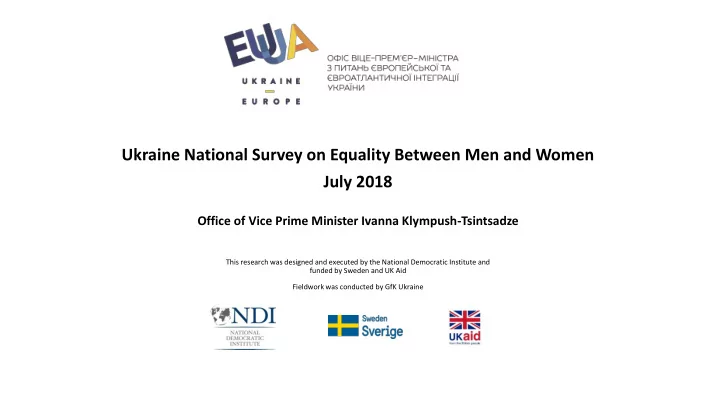

Ukraine National Survey on Equality Between Men and Women July 2018 Office of Vice Prime Minister Ivanna Klympush-Tsintsadze This research was designed and executed by the National Democratic Institute and funded by Sweden and UK Aid Fieldwork was conducted by GfK Ukraine
What is Democracy? How Important is it? 2
3
81% say it is important or very important to them 4
How Important is Equality Between Men and Women? 6
77% (81% of women and 73% of men) gave 7-10 responses meaning that equality is important, very important or extremely important for them 7
One word you associate with: Equality (q4a) 8
One word you associate with: Equality between men and women (q4b) 9
Do men and women care about the same day-to- day issues? 10
In general, men and women are concerned about the same issues in their daily lives 11
An overwhelming majority of respondents think that men and women are equally concerned about all but two of these issues 12
How well do women and men understand each others’ concerns? 13
Challenges that women face, that they Challenges that men face, that they think think men are not aware of women are not aware of 14
Who Takes Decisions in the Family and How is That Changing? 15
40% think that men and women are equally involved in family life now. However, 71% think that men and women should be equally involved, indicating that there is strong demand for more progress to be made in this direction. 16
Regional responses do not vary significantly on this question 17
18
Respondents of all ages have similar views on this question 19
There is a clear generational difference on all of these types of decisions. More men and women are participating equally in important family decisions 20
73% gave 7-10 responses, meaning that the involvement of men is important, very important or extremely important to them. The attitudes of men and women are same on this question. 21
22
23
Who should be primarily responsible for different activities, men or women? 24
On most of these issues, a majority think that men and women should share responsibility equally. However on cleaning and cooking a majority think women should be primarily responsible. On bread-winning, household repairs, defending the country and policing the streets, a majority think men should be primarily responsible. 25
There are some differences in the responses of men and women but they are small - only just outside the margin of error. 26
How Equal is Life at Work? 27
There are no statistically significant differences between how respondents evaluate what happens now and what they think should happen, indicating that the level of equality they seek in participation in the labour force has almost been achieved. 28
There are some regional differences in the responses to this question, with greater demand for equality in the South. 29
66% gave 7-10 responses, meaning this is important, very important or extremely important for them. Men are significantly more likely to give a 10/10 response on this question than women. 30
On all but one of these issues, a majority believe that men and women experience equality at work. However, those with minority opinions include both men and women. The number who think there is equality falls sharply when the question relates to bullying and sexual harassment. 31
32
33
34
13% of the sample translates as 4.5 million Ukrainian adults. 0.6% of the whole sample, equivalent to 225,000 said the harassment occurred online 35
36
25% of the sample translates as 8.7 million Ukrainian adults. 37
38
The responses of men and women are the same on this question 39
40
The responses by age and gender are the same on this question. 41
42
43
How Equal is Political Life? 44
66% see that politics is male-dominated now but only 36% think this is how it should be. 61% want a more equal balance 45
46
Age is not a factor on this question 47
48
49
Currently approximately 13% of ministers of the Cabinet of Ministers are women On questions about the Currently approximately 12% of Member number of women in of the Parliament are women political life, at all levels, women are more likely than men to demand an increase. Currently approximately 15% of Members However, significant of oblast councils are women numbers of men are also demanding change. Currently approximately 15% of heads of amalgamated communities are women Currently approximately 8% of city mayors are women 50
Methodology – Fieldwork dates: July 2 – July 23, 2018 – 2,558 completed interviews • The nationally representative sample was random at all stages: – Random selection of election precincts – Random selection of households via random route sampling – Random selection of respondents within the households using modified Kish grid • Areas outside the control of the Ukrainian government were excluded – Quality control: • All interviewers received a four level training system which includes 16 hours of training • An independent network of controllers conducted quality control interviews • 20% of all interviews were checked by controllers • All interviews were conducted using tablets • Average margin of sample error +/-3% 51
Survey Methodology 2 • The average margin of error for this survey is +/- 3% • The margin of error is different for every response to every question in all surveys. In this presentation, the margin of error is shown for each question/option. • This is shown in the example below: • A is statistically greater than B and C. • There is no statistical difference between B and C. 52
Macro regions 53
Recommend
More recommend